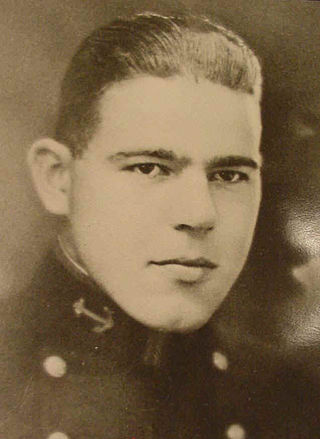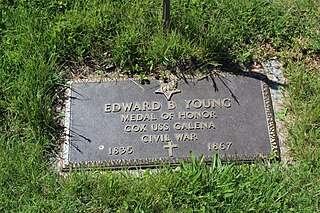
The Silver Star Medal (SSM) is the United States Armed Forces' third-highest military decoration for valor in combat. The Silver Star Medal is awarded primarily to members of the United States Armed Forces for gallantry in action against an enemy of the United States.

The Navy Cross is the United States Naval Service's second-highest military decoration awarded for sailors and marines who distinguish themselves for extraordinary heroism in combat with an armed enemy force. The medal is equivalent to the Army's Distinguished Service Cross, the Air and Space Forces' Air Force Cross, and the Coast Guard Cross.

The first USS Rhode Island was a side-wheel steamer in the United States Navy, commissioned in 1861.

The second USS Metacomet was a wooden sidewheel steamer in the United States Navy during the American Civil War. The ship was named for Metacomet, a war chief of the Wampanoag Indians.

The first USS Pensacola was a screw steamer that served in the United States Navy during the U.S. Civil War.

Henry Clay Drexler was an Ensign in the United States Navy and a recipient of both the Navy Cross and the Medal of Honor.
James Stoddard was a Union Navy sailor in the American Civil War and a recipient of the United States military's highest decoration, the Medal of Honor, for his actions during an engagement in Yazoo City, Mississippi.

The first USS Leyden was a screw steamer that operated as a tug in the U.S. Navy from 1866 to 1903 and saw combat service in the Spanish–American War in 1898.

Thomas Burke was an Irish-American sailor in the United States Navy and a recipient of the United States military's highest decoration, the Medal of Honor.
Patrick Regan was a United States Navy sailor and a recipient of the United States military's highest decoration, the Medal of Honor.
Michael Deneef (1851–1891) was a United States Navy sailor and a recipient of the United States military's highest decoration, the Medal of Honor.
Richard Ryan was a United States Navy sailor and a recipient of the United States military's highest decoration, the Medal of Honor.
John Everetts was a United States Navy sailor and a recipient of the United States military's highest decoration, the Medal of Honor.

John Wellesley Magee was a second class fireman serving in the United States Navy who received the Medal of Honor for bravery.
Edwin Smith was a Union Navy sailor in the American Civil War and a recipient of the U.S. military's highest decoration, the Medal of Honor, for his actions during the Joint Expedition Against Franklin.

Edward B. Young was a Union Navy sailor in the American Civil War and a recipient of the U.S. military's highest decoration, the Medal of Honor, for his actions at the Battle of Mobile Bay.
Henry Johnson was a Union Navy sailor in the American Civil War and a recipient of the U.S. military's highest decoration, the Medal of Honor, for his actions at the Battle of Mobile Bay.
Daniel Noble (1838–1903) was a Confederate prisoner at Camp Douglas before becoming a Union Navy sailor in the American Civil War and a recipient of the U.S. military's highest decoration, the Medal of Honor, for his actions at the Battle of Mobile Bay.

Patrick Murphy was a Union Navy sailor in the American Civil War and a recipient of the U.S. military's highest decoration, the Medal of Honor, for his actions at the Battle of Mobile Bay. A native of Ireland, Murphy began his seafaring career as a teenager aboard merchant ships in the North Atlantic and served for two years in the Royal Navy. He joined the U.S. Navy after settling in Erie, Pennsylvania, and sailed the Great Lakes as a petty officer on USS Michigan. During the American Civil War, he served aboard USS Metacomet and distinguished himself in the action at Mobile Bay. He returned to Erie and USS Michigan after the war, continuing on that ship for twenty more years until retiring as a warrant officer.

James McLeod was a Union Navy sailor in the American Civil War and a recipient of a Medal of Honor, for his actions at the Battle of Forts Jackson and St. Philip.











